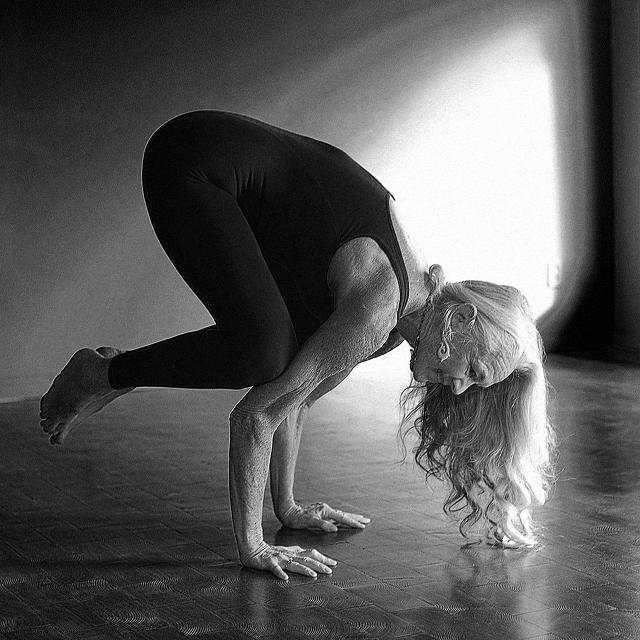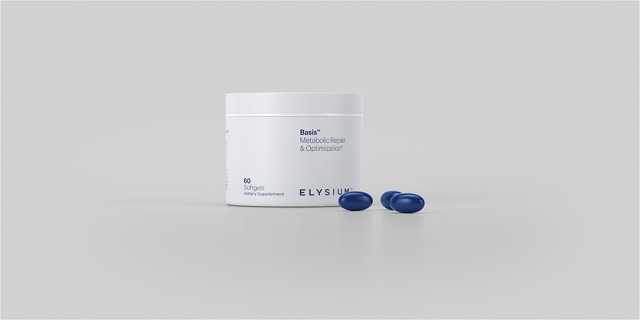One Of The World's Top Aging Researchers Has A Pill To Keep You Feeling Young
Elysium Health hasn't discovered the fountain of youth, but their new supplement—with the backing of some of the world's foremost authorities on aging—could change how you get older.

[Top photo: Sarah Salmela/Getty Images]
Say someone came up to you selling a dietary supplement—a pill that you take once a day—that could boost your energy, improve your body’s ability to repair its DNA, and keep you healthier as you get older.
It might sound like a scam, or more likely just another in a sea of confusing, undifferentiated claims that make up the $20 billion dollar supplement industry.
But let’s say that someone is MIT’s Lenny Guarente, one of the world’s leading scientists in the field of aging research. And he’s being advised by five Nobel Prize winners and two dozen other top researchers in their fields. You might pay a little more attention.

THE SCIENTIST AND THE STARTUP
Cofounding a supplement company seems an unlikely career move for someone like Guarente, a man who is one of the most well-respected scientists in his field. ("It is a departure," Guarente admits). Mostly, for him, getting involved in Elysium Health is a decision born out of opportunity and frustration. The opportunity is the chance to make a difference by translating findings in the booming field of aging research directly to consumers today. The frustration is that doing this has taken so long in the first place.
"My biggest hope is that we can make available to people something that is currently unavailable, and that it will have a positive impact on their health," Guarente says.
Elysium Health actually had its beginnings in conversations between its other two, younger cofounders, Eric Marcotulli and Dan Alminana, who were then tech investors and gym buddies. Even though they’re both quite health-conscious, they knew they couldn’t halt the march of aging and all the ailments that come with it. Far more than diet or anything else people can control, the biggest risk factor for many of the diseases that kill us—including diabetes, cancer, and cardiovascular disease—is simply getting older.

Marcotulli knew something about the market opportunity too, which has also lately attracted the likes of Google (with its Calico Labs project) and other SIlicon Valley investors. He had studied the story of a company called Sirtris Pharmaceuticals, which in the mid-2000s was working to take resveratrol, the natural anti-aging compound found in red wine, and alter it into a more potent form that could be patented and developed into a medical drug. In 2008, Sirtris—founded by Guarente’s former postdoc David Sinclair—was acquired by the drugmaker GlaxoSmithKline for a jaw-dropping $720 million.
"The fundamental question was: Are there other natural products out there that could be meaningful? I think resveratrol was the first, and I was thinking there’s maybe the potential for many others," Marcotulli remembers thinking as he studied the story while in business school.
The two started cold-calling scientists involved in aging research and were surprised how many were enthusiastic about the idea, including Guarente. The FDA doesn’t recognize aging itself as a condition, so, instead, companies like Sirtris and GSK are are taking scientific findings about how we age and translating them into drugs that treat specific age-related diseases. The issue is that the clinical trials involved in doing this can take more than a decade, and even then that is no guarantee a drug will be approved. The result has been that, though scientists have made major strides in understanding how and why we age and demonstrating that this aging can be delayed, they’ve so far seen few results in translating their work to help people.
ADVERTISEMENT
Learn More
The two entrepreneurs wanted to take a very different approach than the drug makers: sell only unaltered natural products, which generally aren’t patented and don’t need FDA approval, and create new kinds of supplements that make no claim to treat a specific disease but promote general wellness instead.
"If there’s a benefit that can be had now, then I think it doesn’t make sense to wait a decade or more until some derivative [from a drug company] becomes available—though I’m not saying that’s not a good thing to do too" says Guarente.

The three cofounders have been taking the company’s first product, a pill they are calling BASIS, for the last three to five months. Through its website, Elysium Health will sell a one-month supply to consumers for $60, or $50 with a monthly subscription.
BOOSTING NAD
The theory behind the pill is built on work first pioneered in Guarente’s lab on sirtuins, a group of enzymes involved in cell metabolism and energy production that are common to a wide range of living organisms. Researchers have found that boosting the activity of sirtuins, which is sometimes done by calorie restriction diets, can extend lifespan of yeasts, worms, mice, and other animals. Efforts to develop a drug that can have the same effect, without the lack of calories, have been going on for the last two decades, including at Sirtris and GlaxoSmithKline. There are also natural compounds that elevate sirtuins—one is resveratrol, which is already sold as a dietary supplement today. Another is called NAD.
NAD—Nicotinamide adenine dinucleotide—is one of the most compelling bits of chemistry related to aging. Its presence in the body is directly correlated with the passage of time: An elderly man will have about half the levels of NAD is his body as a young person. There’s no amount of healthy eating or exercise that can stop the decline. But in a scientific paper published in 2013 that generated headlines about "reversing aging," Harvard’s Sinclair showed that after a week of giving two-year-old mice a boost of NAD, their tissues looked more like six-month-old mice.
Elysium’s pill is an attempt to replicate that process naturally in humans. It contains the building blocks of NAD, so the body can easily absorb the smaller molecules and synthesize its own. The pill also contains pterostilbene, a compound, that is a close relative of resveratrol, but which Guarente says is potentially more potent and effective.
Elysium explicitly wants to avoid the charlatan feel of the countless "anti-aging" products on the market today. It isn’t selling the pill as a key to a longer life or to preventing any particular disease, since there isn't any evidence the pill will do that. A press release the company put out with its launch hardly mentions aging at all. (Another reason is they want to appeal to young people too, who don’t necessarily care about aging, but may want to feel healthier and more energetic). Instead, the founders talks about enhancing basic biological functions: improving DNA repair, cellular detoxification, energy production, and protein function.
"We have no interest in being an anti-aging company and extending lifespan," says Marcotulli. "For us this is about increasing healthspan, not lifespan."
THE FUTURE OF DIETARY SUPPLEMENTS
There is a downside to the model: They can't patent their work. Some companies already sell supplements for each of the two ingredients in BASIS, and others could copy Elysium as soon as it releases its next products. That’s where Elysium’s business model— and its scientific superstars—come in.
The company aims to be very different type of dietary supplement company—the founders cite the hip, design savvy consumer brands Warby Parker, Oscar Health, Harry’s, and Nest as their role models. (Warby Parker co-CEO Dave Gilboa and one of its early investors, Kal Vepuri, are angel investors in Elysium. Martin Lotti, creative director for Nike’s soccer division, is a strategic advisor.)
"Our vision and mission is to bring scientifically validated natural health products to market through these traditional retail channels," says Marcotulli. "But it also takes the best aspects of the pharmaceutical model—the R&D focus, clinical rigor, and following these consumers over time."
Its products will only be sold on its website, where Elysium can control more nuanced messaging than on store shelves. Branding, trust, and scientific expertise are what the team hopes differentiates them from the faceless companies that line Whole Foods’ shelves. At the most basic level, that means trust that the pill contains what it says it contains, but also beyond that, trust that it is doing a person any good.
Elysium assures the ingredients in its products will all be pure, and it will do its own safety testing, as well as test for a basic level of efficacy. Already, says Guarente, it has tested BASIS at a range of doses for safety and to assure that NAD levels in the body actually increase from taking its pill. Over time, the team hopes to also collect data back from customers to start demonstrating some of the longer-term benefits over months and eventually years.
Nir Barzilai, director of the Institute for Aging Research at the Albert Einstein College of Medicine, says Elysium has a good business idea based on sound science and an impressive team. As someone who is not involved in the company, his one fear is that if something went wrong with a top scientist like Guarente’s name attached, it might set back the whole field of research. Though not required by the FDA, he urges the company to go above and beyond in all of its testing. "People are going to overuse it, and I’m sure if you have too much of it, it could have some effect we can’t predict," he says.
For Elysium’s next products, which might touch on other areas such as brain health or musculoskeletal health, it will start to tap into the expertise of the formidable list of more than 30 scientific advisors signed on—everyone from Eric Kandel, a brain scientist who received the 2000 Nobel Prize in medicine to Tom Sudhof, a cellular physiologist at Stanford who received the prize in 2013. Eventually, it hopes to expand this network of scientific expertise further to as many scientists that want to get involved.
If anything, Elysium might make more people aware that aging is becoming something that we may one day treat.
"There has been an explosion of science in the field of aging. And I think the public doesn’t really realize how far aging research has come. We have a lot of ideas about the mechanisms of aging, and tons and tons of pathways that can be optimized, tweaked, or activated to possibly extend lifespan," says Stanford University aging researcher Stuart Kim, who is on Elysium’s scientific advisory team. "I think the public is probably about 30 years behind our thinking about aging. It’s as if we thought about cancer in the way we did in 1960."
THESE FOODS CAN HELP YOU STAY PRODUCTIVE
Soon Your Doctor Might Prescribe Virtual Reality Instead Of Painkillers
The Happy Place VR app uses nature settings to distract patients from their pain—and there's lots of evidence that this strategy works.

The next time you have a headache, a Swedish pharmacy wants you to strap on a virtual reality headset and pretend you're sitting next to a campfire by a lake in Sweden, watching the Northern Lights as night falls.
The pharmacy, Apotek Hjärtat, designed a free VR app for pain relief called Happy Place.
"Pain prevention is not just pharmaceuticals," says Annika Svedberg, head pharmacist at Apotek Hjärtat. "There are alternative ways to treat pain, for example with exercise or massage. With Happy Place, we wanted to offer people the opportunity to try a completely new way to manage their pain."
Several independent studies show that virtual reality can help the brain stop focusing on physical pain. One early VR game called SnowWorld helped burn victims reduce the amount of time they spent thinking about pain from 76% to 22%—even when the pain was severe. The VR equipment used in SnowWorldstudies costs tens of thousands of dollars. Now, mass-market headsets are making VR pain relief more accessible.

The pharmacy's simple app lets someone sit near a mountainside lake during the day or night. "There is evidence that simply spending time in nature has a therapeutic value, and the scientists are investigating if the same effect can be reproduced with virtual nature," says Svedberg. "And we knew from the start that we wanted to create something that felt like a place, to create this effect we opted for day, night, and weather cycles to make nature seem more real."
Because their budget was limited, the app doesn't try for photorealism, but they say that the cartoonish style might improve the experience. "A counterintuitive fact about VR is that stylized rather than realistic art direction actually helps in suspending disbelief and maximizing presence," she says.
The pharmacy envisions the app typically being used along with painkillers, though some research suggests that in some cases virtual reality on its own can work as well as a drug. In some circumstances, people might not have a choice but to turn to drug alternatives.
"There is a limit to how many painkillers you can take in a day, and in these cases it could be very helpful to use a VR app like Happy Place as a complement to painkillers," says Svedberg.
"The challenge now is figuring out first where and what situations in which apps like Happy Place can add practical and real value," she says. "There are plenty of situations where you are experiencing pain and won’t necessary take drugs, but still would enjoy escaping the world and the body for a while with an app like Happy Place."
The other challenge: Most people don't yet own VR headsets. The pharmacy will also let people use headsets in some of its locations, but it might take a long time before most people can use this at home.

No comments:
Post a Comment